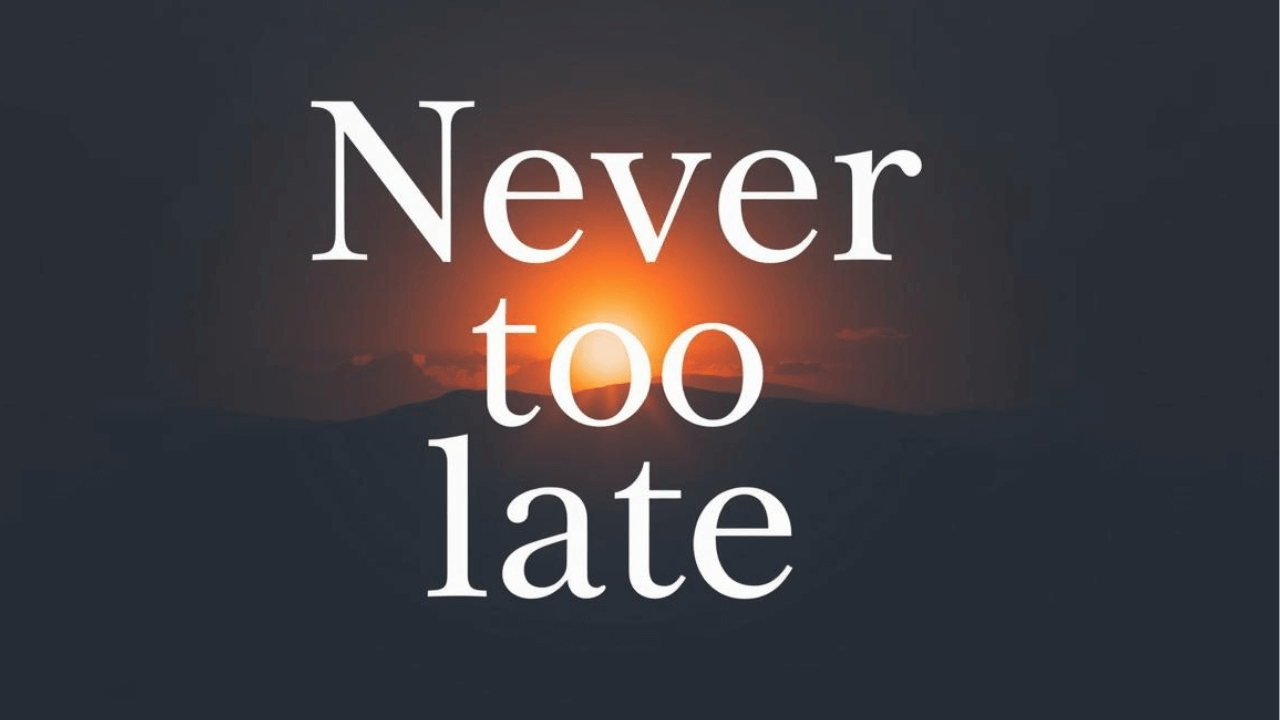
Have you ever caught yourself wondering, “What if I had become a…?”
Maybe it shows up when you see someone doing work you once dreamed about, a lawyer passionately arguing a case, a designer sketching freely, a therapist listening with calm compassion. For a moment, it hits you right in the chest.
You might not say it out loud because sometimes it’s too tender to admit. There can be a little ache behind it, even a bit of embarrassment. The thought of I should have. I missed my chance.
If that sounds familiar, you’re not alone. I call this the career that got away.
Most people, including myself, have one. It’s the path we didn’t take, the profession we dreamed about in college or in our twenties before life, finances, family, or practicality nudged us in another direction. It lingers in the background, not as a failure, but as that thought you can’t quite shake: “What would life look like if I’d said yes to that path?”
But here’s the truth I’ve learned over years of coaching: the career that got away isn’t really about the job title you missed.
It’s about the deeper drive behind it, the qualities of that path that still call to you today.
Once you uncover those, you’ll realize, you’re not starting over. You’re simply realigning forward.
Let’s talk about how.
🎧 Prefer to listen? Hunted by the Career That Got Away?
What “The Career That Got Away” Really Means
The first time I said the phrase “the career that got away” was in a coaching session with a client named Natalie. I didn’t realize how much it was going to resonate.
Natalie was successful, respected, and good at what she did, but she couldn’t shake this one thing. Every few months, she’d find herself on law school websites at 11 p.m., scrolling through admissions pages she never actually planned to fill out. When she mentioned it, she laughed and said, “It’s like an itch that never goes away.”
That’s when I told her, “You know, most people, including me, have that career that got away.”
For her, it wasn’t really about the law itself. It wasn’t the courtroom, the case files, or the long nights. What drew her in was the idea of advocating for people, using her voice to create fairness and structure, and making an impact that mattered.
Once she saw that, everything shifted. She realized she didn’t have to go back to law school to honor that part of herself. She started leading advocacy projects inside her company and volunteering with a veterans’ organization.
And just like that, her nostalgia became direction again. What she’d been missing wasn’t the career she left behind. It was the part of herself that still wanted to make a difference.
That’s what this concept is really about. It’s not about mourning a lost dream. It’s about decoding it. Because underneath that old ambition are clues to your most authentic motivations.
My Own Lost Job Story: The Truth Behind My Statistics Dream
My own “career that got away” was statistics.
Growing up, I was that kid who actually liked math. Patterns made sense to me. Logic felt comforting. And my parents never stopped saying, “You should study this.” They probably weren’t wrong. I’ve always loved solving problems, spotting patterns, and turning something messy into something that finally made sense. That moment when the pieces click? I’ve always chased that.
But when it came time to choose a major, I did what so many of us do... I rebelled. I picked something that felt like the opposite of what I “should” do and studied philosophy instead. That decision eventually led me to a master’s in global leadership and sustainable development, and later to a corporate career in HR and recruiting. All very human-focused, not statistical at all.
For years, I told myself I’d missed my calling. I thought I should have listened to my parents and studied math. I could picture another version of me, the one sitting behind a screen, crunching numbers, solving complex problems, quietly thriving in that precision.
But then something clicked when I became a career coach.
I realized it was never about the numbers. What I actually loved was finding clarity in complexity, seeing patterns, solving problems, making something confusing make sense.
And that’s exactly why I’m so drawn to career coaching, especially career clarity. It’s the same fascination, just with people instead of data. My work now is one big, beautiful question: What are people meant to do?
I get to help others identify the patterns in their own stories, uncover what truly drives them, and design careers that make them come alive.
That realization makes me so grateful that “the career that got away” led me right here.

Why “The Career That Got Away” Feels So Powerful
People often assume their unpursued path represents regret. But most of the time, it’s not regret at all. It’s longing for alignment, for meaning, for that version of you that once felt alive and possible.
That “missed” career usually symbolizes something emotionally charged. Maybe it’s the creative side of you that’s been quiet for too long. Maybe it’s the part of you that loved to take risks. Or maybe it’s the person you were before you started choosing “practical” over “passionate.”
Here’s what’s actually happening beneath the surface when you think about the career that got away:
It connects to identity.
You’re remembering a version of yourself that felt deeply authentic, before the world told you what was practical.
It stirs unfinished energy.
You might not want to start over, but something about that path still holds energy. It’s unfinished business in the best sense.
It signals your core values.
The career you “lost” usually represents the very qualities that feel missing now, like purpose, creativity, freedom, connection, or service.
When you identify those threads, you can begin weaving them back into your current or next chapter.
7 Steps to Reclaim the Career That Got Away
Step 1: Identify the Career That Got Away
Let’s start with a gentle reflection.
Ask yourself:
- What career path do I sometimes daydream about, even years later?
- When do I feel that “what if” twinge?
- If I could wave a magic wand and try something new without consequences, what would it be?
Don’t edit your answer. Don’t rationalize. Just notice what rises up.
It might surprise you. Sometimes, it’s not the career you told people about, it’s the one you secretly imagined when no one was watching.
Maybe it’s becoming a teacher, opening a bakery, writing a book, or going back to study architecture.
One of my clients, Anna, had spent 15 years in software sales but confessed that she still thought about becoming an architect, a dream she’d shelved after college when she needed a stable paycheck. We explored what drew her to architecture: designing systems that are both beautiful and functional. That’s when she realized: “That’s exactly what I love about my job now, solving complex problems with creativity.”
She didn’t have to quit her career. She started leading cross-functional innovation projects and mentoring younger employees in creative problem-solving. Suddenly, work felt more meaningful again, not because she changed jobs, but because she reconnected with why she cared in the first place.
Step 2: Deconstruct the Dream
Once you identify the career that got away, the next step is to deconstruct it.
Ask yourself:
- What was it about that career that appealed to me most?
- Was it the environment? The mission? The kind of people who worked there?
- What deeper needs or values did it fulfill?
One of my clients once told me her dream was to own a shack on the beach where she’d sell beer and rent surfboards. She’d light up when she talked about it, the sunshine, the ocean breeze, the freedom of it all. She was getting ready to leave the military and was in that space of asking, “What’s next for me?”
So I asked her, “That’s a beautiful image. Tell me, what do you see yourself doing there every day?”
She thought for a moment and said, “Talking to people. I’d meet locals and travelers, hear their stories, get to know where they come from.”
I smiled and said, “So it’s not actually the beer or the surfboards that excite you, it’s the conversations.”
Her face lit up. “Yes! That’s exactly it. I’d just love to hear about their lives, their journeys, their thoughts, their feelings, to really connect with people.”
And that’s when it clicked. Her “career that got away,” owning a beach shack, wasn’t about running a small business at all. It was about deep human connection. A year later, she enrolled in school to become a therapist, studying psychology and mental health.
That’s what this work is about, uncovering the truth underneath the fantasy. Sometimes what we think we’ve lost isn’t the dream itself, it’s the feeling the dream promised us. Once we identify that, we can finally build something real around it.

Step 3: Rebuild Your Lost Career Dream in Real Time
Here’s the liberating truth: you don’t have to start over to honor your calling. You just need to find new ways to express it right where you are.
If you once wanted to be a teacher, maybe mentoring or leading workshops scratches that same itch.
If you dreamed of being a doctor, maybe your desire to help shows up through mental health advocacy, coaching, or wellness work.
If you wanted to be an artist, maybe creativity lives in how you design, write, or innovate inside your current field.
One of my clients, Priya, always wanted to study psychology but ended up in tech. She thought she had missed her chance. When we explored what drew her to it, understanding people, helping them grow, creating better experiences, she realized those same themes already lived in UX design. A few years later, she was designing products for a mental health startup, blending both passions seamlessly.
You can do that, too.
This is what I mean when I say “the career that got away” isn’t really gone. It’s simply waiting for you to reimagine it.
Step 4: Reframe Your Career Story
The words you use to describe your past matter more than you think.
When you say, “I missed my chance,” your brain closes the door.
When you say, “That was a clue about what energizes me,” the door opens again.
Reframing your story transforms nostalgia into strategy.
Instead of thinking, “I should have been an artist,” try, “I’m a creative who can bring artistry into what I do now.”
Instead of, “It’s too late to go back,” try, “I can integrate what I loved about that path into my future direction.”
You’re not erasing your past. You’re expanding your definition of success.

Step 5: Design Forward: Use The 'What' and 'Where' Levers
Once you’ve reframed your story, the next step is to design forward, to intentionally shape what comes next based on what you’ve learned about yourself.
I always encourage people to think about two dimensions of their career: what you do and where you do it.
“What you do” refers to your role, your skills, responsibilities, and day-to-day activities.
“Where you do it” refers to the company, industry, or mission you align those skills with.
Sometimes the quickest way to bring the “career that got away” closer isn’t by changing what you do, it’s by changing where you do it.
Here’s how to design forward with that in mind:
1. Map Your Motivators
Start by listing what your “lost” career represented, creativity, purpose, connection, freedom, service, stability, learning.
These are your career values, your compass for future decisions. They show you what truly fuels your energy and engagement.
2. Audit Your Current Role
Ask yourself: Where do I already express these values? Where are they missing?
This simple reflection reveals where alignment is possible, sometimes through small but powerful adjustments in your current work.
3. Play with the “What” and the “Where”
If your “career that got away” feels far off, explore how to bridge the gap through one of these levers:
- Adjust the “what.”
Could you evolve your role to include more of what energized you about that lost career, advocacy, creativity, strategy, mentoring, analysis? - Shift the “where.”
Could you bring your existing expertise into an environment that reflects that dream more closely?
For example:
- If law was your missed path but you became an accountant, could you work as an accountant at a law firm to stay close to that world?
- If you always loved mental health but ended up in tech, could you join a company like Calm, Headspace, or another organization bridging tech and wellbeing?
- If you once dreamed of policy or human rights work, could you bring your background into a social impact organization, a corporate foundation, or a mission-driven company that lives those values daily?
Ask yourself: Which lever, the what or the where, brings me closer to the essence of my “career that got away”?
4. Explore Adjacent Possibilities
You don’t need to start from scratch. Sometimes the bridge between where you are and where you want to be is surprisingly short.
Someone who dreamed of journalism might thrive in brand storytelling. A “lost” passion for education might come alive through mentoring or leading workshops. A love for medicine might evolve into wellness technology or health advocacy.
The possibilities expand when you stop chasing a title and start following the essence of what lights you up.
5. Prototype Before You Leap
You can test your next chapter without overhauling your entire career. Take a course, volunteer, join a project, or start a small experiment.
Realignment doesn’t require massive change, it begins with curiosity.
As I often tell my clients: You don’t have to change everything to change how you feel. Sometimes the right environment, mission, or project is all it takes to make your work feel meaningful again.
Ready to discover your dream career? Book your free Career Clarity Call today!
Step 6: Rewrite “Success” on Your Own Terms
Sometimes, what makes the career that got away so painful isn’t the job itself, it’s the story we tell ourselves about what success should look like.
You might believe that choosing a different path means you settled or gave up. But the truth is, you’ve grown. You’re wiser now. And you’re allowed to redefine success as it fits your life today.
I once coached a woman named Maya who had dreamed of becoming a journalist but took a corporate communications job instead. For years, she felt like she’d “sold out.” When we dug deeper, we discovered what she loved about journalism: storytelling, truth-telling, and giving others a platform.
Together, we found ways for her to bring those passions into her current role, launching an internal storytelling series and mentoring young professionals on communication. She rediscovered her sense of purpose without changing her LinkedIn title.
Her “career that got away” became the career she reimagined.
That’s the transformation waiting for you, too.
Step 7: Give the “Lost Career” a Place of Honor
There’s something profoundly healing about acknowledging the career you didn’t pursue, not as failure, but as part of your story.
Write it down. Thank it. Reflect on what it taught you about who you are.
You can even say:
“That career represented something beautiful in me, and I’m ready to carry that forward.”
This small act reframes your past from something you “missed” to something you integrated.
Because here’s the truth: our callings don’t vanish. They evolve with us. What mattered to you then still matters, you’re just wiser about how to live it now.
And that’s where your next chapter begins.

It’s Still Possible, and Always Was
If you take one thing from this, let it be this: You can still do what you were meant to do, just in a different outlet.
You haven’t missed your moment. You’ve simply been collecting the tools to express it differently.
The lawyer’s heart can live in advocacy roles.
The teacher’s passion can shine through mentoring and leadership.
The artist’s soul can thrive in design, innovation, or storytelling.
The psychologist’s curiosity can come alive in coaching, user research, or organizational culture.
Whatever your “career that got away” is, law, medicine, art, entrepreneurship. it’s not gone. It’s guiding you.
You’re not chasing what got away. You’re finally catching up with who you’ve always been.
✨ Ready to go deeper? Download your free reflection guide here:
👉 7 Steps to Reclaim from the Career That Got Away (Free Reflection Guide)
About Career Coach & Author
Theresa White, Career Clarity Expert, 5x Certified Career Coach, and the Founder of Career Bloom, is known for her expertise in guiding people to get unstuck and find the direction they need to move forward in their careers—fast. In a time when so many people are re-evaluating their work, Theresa offers actionable insights that empower clients to identify their true strengths and pursue work that genuinely aligns with their goals.
Theresa’s clients often call her sessions “epiphanies” and “transformational.” She brings immediate clarity to career goals, helping people unlock a deep understanding of what makes work fulfilling for them. Past participants consistently describe her approach as “spot on” and an “answer to questions they’d been asking for weeks.”
Theresa’s approach is empathetic yet practical, and she’s known for empowering clients with a clear direction in as little as 30 days, guaranteeing results.
Connect with Theresa on LinkedIn, listen to the Career Clarity Unlocked Podcast, or schedule your free 30-minute career clarity consultation.

FAQs About the Career That Got Away
1. Is it too late to pursue my dream job after a career change or lost job?
Not even close. Careers aren’t straight lines—they’re messy, twisty, full of plot twists, and that’s what makes them interesting. Every skill you’ve picked up along the way is just fuel for your next chapter, not baggage holding you back.
2. Can losing a job help me rediscover what I actually want?
Totally. Losing a job can feel like a punch to the gut, but it also knocks loose the stuff that doesn’t fit anymore. It’s like life’s brutal way of saying, “Hey, you weren’t supposed to stay there anyway.”
3. What should I do if I feel regret over my career choice?
Regret’s just your intuition clearing its throat, trying to get your attention. Instead of beating yourself up, listen to what it’s telling you about what’s missing. Then take that hint and build something better from it.
Related Reads + Freebies
- Download your free reflection guide here: 7 Steps to Reclaim from the Career That Got Away (Free Reflection Guide)
- What to do when you're feeling stuck in career
- 8 progressive companies to work for
- 7 Message Templates to Reach Out to Recruiters
Subscribe now to never miss the latest blog!
Every Thursday, we cover an important topic, actionable advice, and inspiring content to help you find work that makes you feel like *pinch me* I'm getting paid to do this???
We hate SPAM. We will never sell your information, for any reason.




